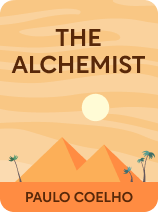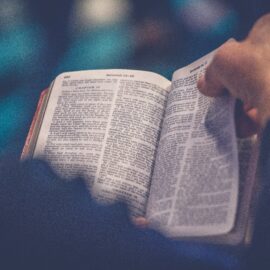

This article is an excerpt from the Shortform book guide to "The Alchemist" by Paulo Coelho. Shortform has the world's best summaries and analyses of books you should be reading.
Like this article? Sign up for a free trial here .
What are the main lessons in The Alchemist by Paulo Coelho? How can you apply the book’s lessons to your own life?
The Alchemist is the story of an Andalusian shepherd boy’s journey of spiritual awakening. The boy gives up everything to embark on a long journey across the desert toward the Egyptian pyramids, to look for a treasure he has dreamed of. He follows omens and the wisdom of spiritual guides he meets along the way.
Here are the biggest lessons Santiago learns during his journey.
1. Follow Your Calling
The first, and arguably the most important, lesson from The Alchemist is to follow your calling. The major insight Coelho reveals through the king is that everyone has what he calls a Personal Legend. This is essentially your calling in life, which you feel as a passion drawing you toward it. It’s that thing you most dream of doing in your life. People feel this pull most strongly in childhood, the king explains, as children are more in tune with the spiritual realm and are not afraid to dream big. However, he says this pull subsides as we grow older and become conditioned to live according to societal expectations. Eventually, many reject their calling entirely, believing it to be unachievable and unrealistic. However, the king explains that everyone’s dream is realizable at any time, and when you pursue it, the universe will work with you to help you achieve it. Pursuing this calling is our only real purpose in life, though most people will never accomplish that.
(Shortform note: The law of attraction tells us that our energy will attract like energy from the universe. In this way, according to The Secret, we can make the universe work with us to achieve whatever we want, by consciously generating the right energy. According to this philosophy we’re all connected as one “great mind,” and it’s through this that we’re able to create our own destiny, essentially by believing in it.)
Over the course of this conversation, the boy is convinced that he needs to follow his calling and go to the Egyptian pyramids to find his treasure. The king advises him that a crucial part of following one’s calling is paying attention to signs.
The boy decides that day to sell all his sheep to buy passage to Africa. In this decision, Coelho is showing us that sometimes we have to make major sacrifices to follow our dreams, and we will come to learn that it’s always worth the risk.
2. Love Needs Freedom
In the story, Santiago tells the alchemist about his mission to pursue his dreams and about his reluctance to leave because he’s fallen in love, the alchemist warns him against falling into that trap. Here, Coelho teaches us, through the alchemist, that true love will never hold you back from following your dreams—this is the difference between love and possession.
The alchemist describes to the boy exactly what will happen if he decides to stay in the oasis with Fatima. He says they’ll be married, and Santiago will become successful and respected in a new career, and then over time he’ll be confronted with the nagging feeling that he still isn’t fulfilled. If he continues to ignore it, the pull toward his dream and the universe’s signs will gradually fade, until he’s resigned and lives the rest of his life knowing he failed to follow his calling. Here, Coelho shows us why many people no longer recognize their calling later in life.
3. Everything Is One
Along their journey into the desert, toward the Pyramids, the alchemist and the boy are kidnapped by a group of tribal warriors. This is the last trial the boy will have to face in the final leg of his journey to the treasure. Through this story, Coelho shows us the importance of taking big risks and believing in the power of transformation.
The tribesmen plan to kill the travelers until the alchemist tells them that the boy possesses magical powers and can transform himself into wind. Of course Santiago has no idea how to do this, and the tribesmen are reluctant to believe it. But they say that if the boy can do that, they’ll recognize his power and spare their lives. This leads us to the pinnacle scene where Santiago has to learn how to transform himself into wind.
He recalls all the wisdom he’s gleaned along this journey and delves into a deep communion with the wind, and then the sun, and he calls upon the powers of nature and the divine spirit of the universe for help. Because the boy has learned to speak the universal language and penetrate the spiritual realm, the universe conspires to help him. He’s able to transform himself into wind and leaves the tribesmen amazed. They hold true to their promise and allow the two to be on their way. Through this story, Coelho shows us the power that faith plays in the transformational process—the boy was able to transform because he believed it was possible, and this belief gave him all the power of the universe on his side.
(Shortform note: The self-help classic The Power of Positive Thinking also emphasizes faith as an important tool for success. In this book, Norman Vincent Peale encourages the reader to develop a belief mindset by meditating on faith affirmations drawn from the Bible. He suggests that repeating these Biblical verses about faith daily will strengthen your belief in yourself and give you the power to overcome obstacles.)
At this point, Santiago knows without doubt that he has learned the true meaning of alchemy, which is uniting the spiritual with the material to create magical transformation. And he realizes this is something that applies to all of life, not just to metals. The alchemist then leaves him alone to discover his treasure.

———End of Preview———
Like what you just read? Read the rest of the world's best book summary and analysis of Paulo Coelho's "The Alchemist" at Shortform .
Here's what you'll find in our full The Alchemist summary :
- A guide to the infamous story by Paulo Coelho
- A breakdown of the symbolism and lessons found in the story
- A comparison of Coelho's ideas to other philosophical and spiritual traditions and beliefs






